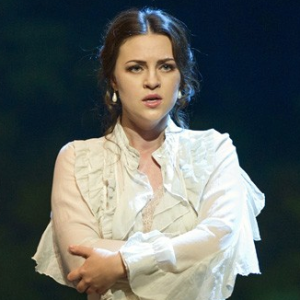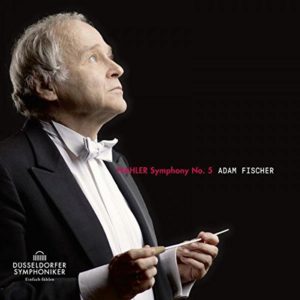La Traviata, Glyndebourne
 Images of Violetta taken to her bed or receding like a ghostly mirage into an eternity of solitude preface and conclude scene after scene of Tom Cairns splendid new staging at Glyndebourne. Designer Hildegard Bechtler has created minimalist surfaces, upholstered or slickly veneered, square or curved and offset by a slash of curtain – crimson for Flora’s parlour, green for the gaming room. The front cloth suggests a curtained window separating Violetta’s private world from her public one and when moving walls finally grant her liberation the effect is quite transcendental.
Images of Violetta taken to her bed or receding like a ghostly mirage into an eternity of solitude preface and conclude scene after scene of Tom Cairns splendid new staging at Glyndebourne. Designer Hildegard Bechtler has created minimalist surfaces, upholstered or slickly veneered, square or curved and offset by a slash of curtain – crimson for Flora’s parlour, green for the gaming room. The front cloth suggests a curtained window separating Violetta’s private world from her public one and when moving walls finally grant her liberation the effect is quite transcendental.
Cairns choreography of the chorus is masterful, shoals of pleasure-seekers – the demimonde – trampling on women’s dignity and devouring Violetta – the scarlet lady (quite literally in act two, scene two) – with their eyes. They are unmistakably predatory, these movers and shakers, and those moments of solitude before Violetta once again enters the lion’s den are extraordinarily telling, her two worlds, her two states, thrown into dramatic relief. Period becomes irrelevant; the opera becomes mythical.
Musically there is much to relish. Mark Elder, ever the elegant stylist in this repertoire, has the London Philharmonic Orchestra exhibiting purity of sound and articulation with a quite wondrous transparency in the rarefied string lines of the first and last scene preludes and a biting, highly rhythmic, banda effect in the ensemble numbers. The big emotional releases are felt as well as heard, none more so than Violetta’s “Love me, Alfredo” which wells up through the tremble of bass drum and is a venting of all that Violetta has ever wanted to express. Elder leaves us in absolutely no doubt that this is the real climax of the opera.
And so does the fabulously talented young Russian soprano Venera Gimadieva as Violetta. Her name is on many people’s lips at the moment and one can see and hear why. Her temperament, fragility and inwardness on stage is quite something to behold and like all really affecting Violettas the core of her voice is possessed of a womanly amplitude and creaminess which extends throughout the range. Her pianissimi are refined to the point of other-worldly and whilst the very top lacks a bit of focus and ping for my taste the notes (including the high E-flat) are all there.
She is wonderfully partnered by the dashing Alfredo of Michael Fabiano whose first priority is always to sing on the interest not the capital and whose range of enticing nuances bring so much stylistic pleasure. Which is not to say he isn’t hot blooded and exciting – far from it. The passion and tenorial swagger are there, too.
Tassis Christoyannis as Germont senior might lack the vocal refinements of his colleagues but he sings with unstinting conviction and plainly – judging from his reception – carries the audience with him. In short, he is real.
But my most lasting memory of a most accomplished evening will be the moment that Violetta asks Germont to tell his daughter of her sacrifice – a moment that Venera Gimadieva made so personal and so heartbreaking and in a few bars of music she completely dispelled her own myth that “a fallen woman cannot raise herself up.”
You May Also Like

GRAMOPHONE Review: Bernstein Symphony No. 2 The Age of Anxiety – Berlin Philharmonic/Zimerman Rattle
10/10/2018
GRAMOPHONE Review: Respighi Roman Trilogy – Orchestra Sinfonica Nationale della RAI/Trevino
15/12/2023

